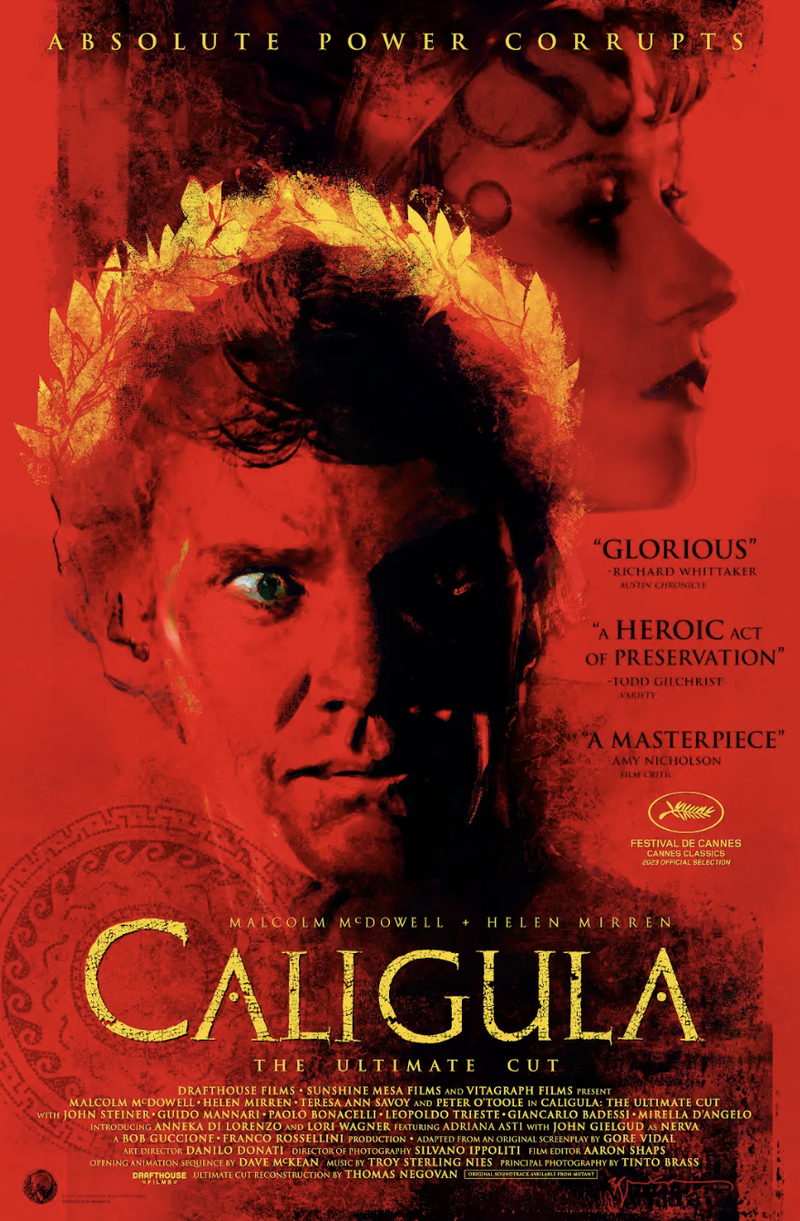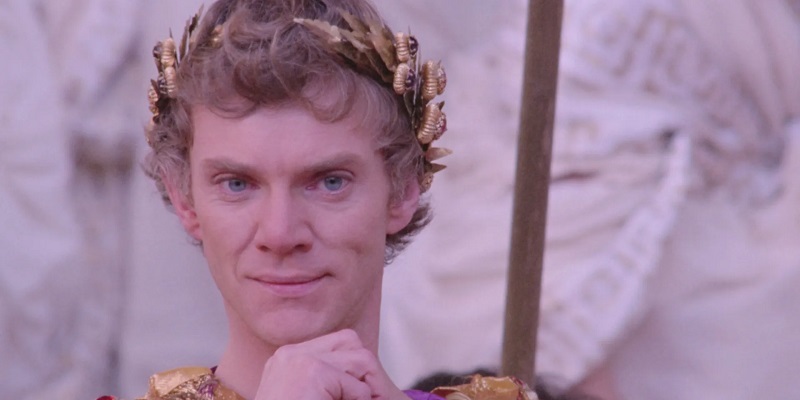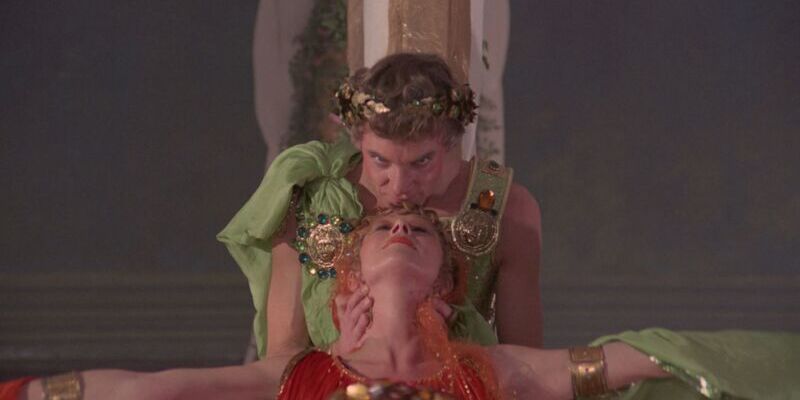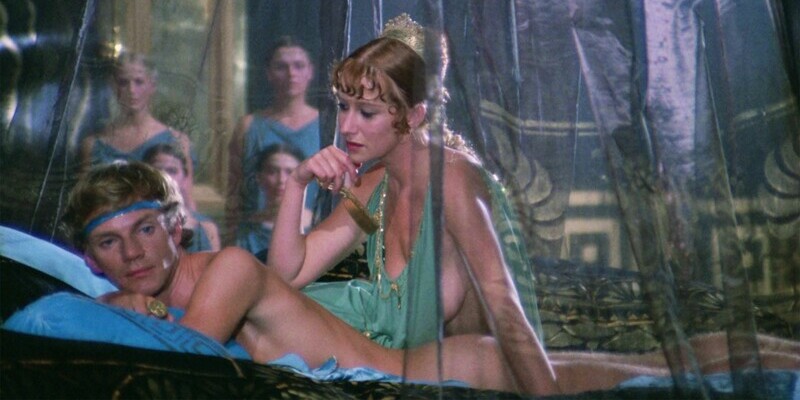
Review by
Benjamin Poole
Directed by: Tinto Brass
Starring: Malcolm McDowell, Helen Mirren, Peter O'Toole, John Gielgud

Almost a half century after its initial 1979 release, and following
various reissues and reiterations, this "Ultimate" cut of
Tinto Brass's Caligula arrives with 22 minutes of
restored footage, and is minus the hardcore pornographic inserts for which
this new material was initially excised (bringing the running time to just
shy of three hours).

Based upon the legendary historical figure, the film
Caligula has its own notoriety. Conceived as quality
semi-pornographic fare, Bob Guccione of Penthouse magazine
envisioned the historical biopic of the Roman emperor as something akin to
Citizen Kane. With an excess congruous to the sybaritic nature of its central
character, Guccione laid on $16 million dollars for the film's budget,
money which went towards the film's outstanding art direction and the
acquisition of a cast of distinction. Perhaps the problems started here:
Orson Welles was offered a million dollars, way beyond his usual fee, to
portray Tiberius, but he refused (Welles would go on to provide the voice
of planet-eating supervillain Unicron in Nelson Shin's Transformers: The Movie). During production, Maria Schneider walked off set, balking at the
expected nudity. Or maybe the issues began even earlier:
Gore Vidal was paid $200,000 for his screenplay, which had to be
extensively rewritten due to the script's apparent mono-focus on
homosexuality, which in turn led to a public slanging match between the
filmmakers. Brass (who would come to disown the film as Vidal initially
did) angrily threatened to publish the original script to shame Vidal:
oooh, get you! Egos continued to abound during filming (there's lots of
petty tittle tattle, my favourite involving Malcolm McDowell, who
played the titular character, being "stingy" and "forgetting to bring
money" to pay for meals - hahaha), and some performances within the
Italian production had to be dubbed into English in post (including
Peter O'Toole, who had gone missing in the interim and then had to
be relocated). And then, a month after filming had ended, in the middle of
the night, Guccione, who felt that the film lacked erotic impact, broke
into the set with a skeleton crew to film unsimulated sex scenes to be
pasted into the existing narrative...
Caligula has a compelling pedigree of overkill and ego, and
the subsequent notoriety which the film has precedes it. Problem is,
though, for all this, the actual process of watching the film is something
of a trial: it's more fun to read about the production than actually
consume it (more and yet more can be found at Ranjit Sandhu's amazingly
curated
Caligula.org). For the sake of context, this is my first proper viewing of the film,
after which, for the purpose of professional completism, I located the OG
porn version and skim watched that, too (I couldn't devote a full quarter
of a day to this folly: which disappoints me, as, with the ostensible
camp, art deco sets and filth of it all, it should have been right up my
strata, cf. the influence on Randee St Nicholas'
Gett Off
music video).

Never mind the supposed calibre of the cast (I've never been keen on
McDowell: he always seems to have a slight disdain for the work, a
pantomime detachment witnessed here as he archetypally makes an avaricious
meal of the scenery - which he no doubt then forgot to pay for, etc.), the
real stars of Caligula are Danilo Donati's costumes
and byzantine sets, a gloriously Romanesque elaboration of columns,
friezes and pagan posture providing milieu for the film's orgiastic set
pieces. The episodic nature of the narrative is shaped to facilitate these
arrangements, with the film segueing from one proscenium arch to the next
with all the sumptuous sequencing of a Roman banquet.
Silvano Ippoliti's camera presents these enriched stage dressings
from an awed distance, using deep focus wide angles and medium shots to
best display the lux production values. The effect is dreamy, woozily over
sensual at times, with the frame having the energised detail of a Richard
Scarry illustration: there are always several things going on within the
background, and one way to pass the time is to pick out the various smutty
configurations the extras are indulging in.
The airless sheen is broken when the film occasionally cuts to exterior
shots, wherein, divorced from the aesthetic artificiality of Caligula's
court and Rome (one set was a mile long facsimile of a 1st century
street), the charade is deflated; the costumes are now fancy dress, and
McDowell is just shouty. Thematically, these scenes coincide with the
increasingly deranged mindset of Caligula suggesting (perhaps
serendipitously so) that outside of the extreme permissions of his office
this leader is nothing. Perhaps similar could be levelled at the film, as
the widescreen confection eventually positions us at a fatal remove from
the action. I concede Guccione's argument that the final product needed
the ultimating of actual sex: pornography necessitates the close up, and
the tight angles of slickly swallowed penises and greedily eaten vaginas
exert a welcome visual rhythm upon the original release, along with
pumping a genuinely illicit thrill into proceedings (it helps that the
guerrilla filmed scenes are glossily beautiful, imbued with the escapist
fantasia and ostensible pleasure which characterises the pinnacle of the
style - unlike the dominant porn du jour which is a grim realisation of
misogynist cruelty). Furthermore, compared to later Brass films, here the
director hadn't yet found the uniquely pervy style he perfected in later
films like, say, Monella¸ where his dirty old man camera leches in up close and personal
reverence of his gorgeous cast.

As much as you have to admire the care which has gone into this reissue of
Caligula, the cineaste's motivation for perceived purity, of director's cuts and
the persistence of auteur theory, is as baselessly absurd as the film
itself. Cinema is always a co-operation, and the palimpsest of
Caligula's visuals is as much a feature of it as the mandated rewrites or
Teresa Ann Savoy stepping into Maria Schneider's calcei. It’s hard
to see what the fuss is, really. In a review typical of other criticism
upon release, Roger Ebert called Caligula "sickening"; and has there been another film from which so many of
the production have later distanced themselves?! Helen Mirren's
role as the beleaguered lover of the emperor has reportedly been expanded
in this version, a welcome addition not only for the formidable presence
of the actor's beauty within the diegesis but also her irl
characteristically pragmatic attitude to this silly and ultimately
harmless nonsense. What others have worked themselves into a right old
disco over, Dame Helen refers to as an "irresistible mix of art and
genitals." Despite the unconvincing aspect of its drama, watching
Caligula there's usually something visually dynamic - a
costume, set dressing, a sculpted body - to appreciate. As Mirren implies,
Caligula is a load of prettily filmed bollocks.

Caligula: The Ultimate Cut is on MUBI UK now.
